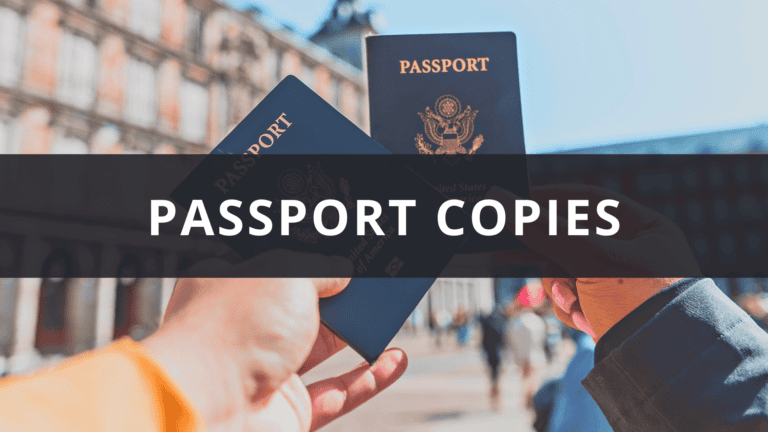What Can Someone Do With a Copy of My Passport? + 5 Tips
Have you ever stopped to wonder “What can someone do with a copy of my passport?”. If the thought has never crossed your mind, it’s time to start thinking about it.
First things first, let’s define what we mean by a “copy” of your passport. This could be a physical photocopy, a scanned version, or even a photo taken with a phone. Essentially, any reproduction of the information on your passport counts as a copy.
What can someone do with a copy of my passport?
A lot, unfortunately. Someone can commit identity theft, fraud, or even blackmail.
Identity Theft
One of the most obvious and potentially damaging things someone could do with a copy of your passport is steal your identity. With access to your name, date of birth, and photograph, a thief could potentially create a fake ID in your name and use it to commit crimes or defraud you.
Fraud
Even if someone doesn’t go so far as to steal your identity, they could still use a copy of your passport to commit fraud. For example, they could use your personal information to open credit card accounts in your name, or to make purchases online using your identity.
Blackmail
This might sound like something out of a movie, but it’s not uncommon for people to use sensitive information as leverage to extort others. In this case, a copy of your passport could potentially be used to blackmail you if it falls into the wrong hands.
Travel Fraud
A copy of your passport could also be used to book travel or accommodation in your name. This could leave you stranded abroad or facing unexpected bills for travel that you didn’t even book.
5 Tips to Protect Yourself
- Be careful who you share your passport with: This one might seem obvious, but it’s worth repeating. Don’t just hand over your passport to anyone who asks for it. Be selective about who you share it with, and only do so if absolutely necessary.
- Keep copies of your passport in a secure location: If you do need to make copies of your passport for any reason (such as for travel visas or work permits), be sure to store them in a secure location. This could be a safe, a locked filing cabinet, or even just a folder with a strong password.
- Use a passport cover: A passport cover can help to protect your passport from damage, but it can also help to protect the information inside. If someone tries to take a photo of your passport while it’s in the cover, it will be much more difficult for them to get a clear image.
- Use a passport holder: Similar to a passport cover, a passport holder can help to protect your passport from damage and make it more difficult for others to access the information inside.
- Consider using a biometric passport: If you’re concerned about identity theft or fraud, you might want to consider getting a biometric passport. These passports use biometric data (such as your fingerprints or iris scan) to confirm your identity, which makes it much harder for someone to impersonate you.
Frequently Asked Questions
Can someone clone my passport with a copy?
It’s theoretically possible for someone to create a fake passport using a copy of your passport, but it would be very difficult to do so. Passports use a variety of security features (such as holograms and watermarks) to prevent counterfeiting, and it would require a high level of skill and specialized equipment to successfully replicate these features. In addition, most countries have strict laws in place to prevent passport counterfeiting, so anyone attempting to do so would be taking a significant risk.
Is it illegal for someone to make a copy of my passport?
In most cases, it is not illegal for someone to make a copy of your passport as long as they have a legitimate reason for doing so. For example, if you need to provide a copy of your passport for a visa application or to open a bank account, it would be perfectly legal for the relevant authorities or institutions to make a copy. However, if someone makes a copy of your passport without your permission and with the intention of using it for nefarious purposes (such as identity theft or fraud), it could be considered illegal.
What should I do if I think my passport has been compromised?
If you suspect that your passport has been compromised, the first thing you should do is contact your nearest passport office or embassy. They will be able to advise you on the best course of action, which may include canceling your existing passport and getting a new one. It’s also a good idea to monitor your credit report and financial accounts for any suspicious activity, and to report any instances of identity theft or fraud to the relevant authorities.
In conclusion, it’s important to be cautious about who you share your passport with and to protect your personal information as best you can. While it’s not always possible to completely prevent identity theft or fraud, taking steps to secure your passport can go a long way towards reducing your risk. Happy travels!
References:
- “Identity Theft Statistics.” Identity Theft Resource Center. https://www.idtheftcenter.org/statistics/.
- “Identity Fraud Statistics.” Javelin Strategy & Research. https://www.javelinstrategy.com/coverage-area/2019-identity-fraud-report.
- “Identity Theft and Your Passport.” Department of State. https://travel.state.gov/content/travel/en/international-travel/while-abroad/legal-considerations/legal-rights/identity-theft-and-your-passport.html.
- What to Wear in Cancun by Month & Activity (And Not!) - March 13, 2023
- What to Wear in New York by Month & Activity (And Not!) - March 13, 2023
- What to Wear in Morocco by Month & Activity (And Not!) - March 13, 2023

